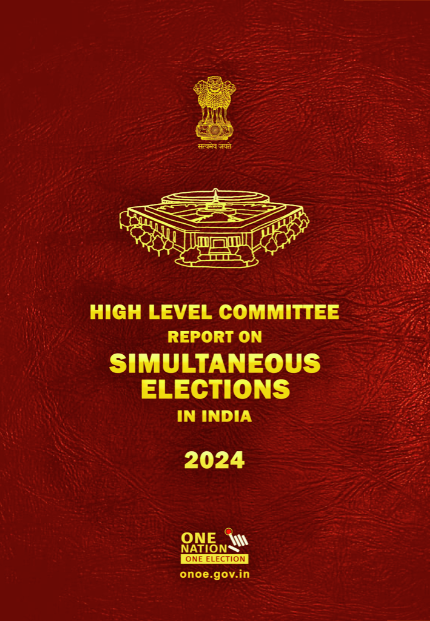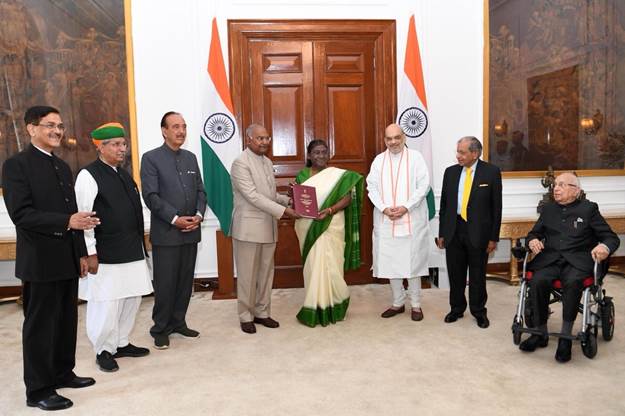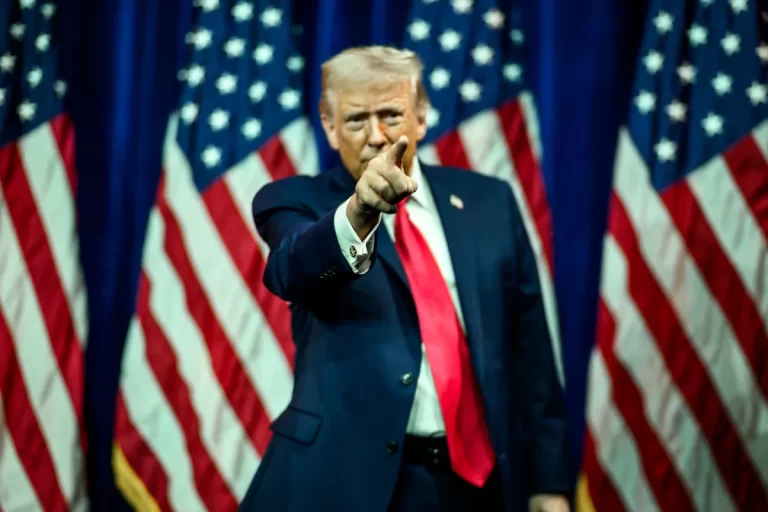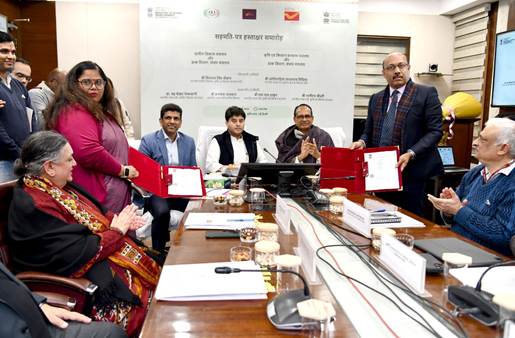
New Delhi: The High-level Committee on Simultaneous Elections constituted under the Chairmanship of Ram Nath Kovind, former President of India, concluded that the holding of simultaneous elections in no way compromises the federal structure and democratic values.
“The Constitutional Framework provides for enough safeguards to foster a resilient and vibrant democracy,” the Committee stated, adding that simultaneous elections serve as a testament to the evolving nature of constitutional governance, which requires a vigilant and participatory citizenry.

The High-level Committee met President Droupadi Murmu and submitted its Report. The Report, comprising 18,626 pages, was an outcome of extensive consultations with stakeholders, experts and research work of 191 days, since its constitution on September 2, 2023.
“After consideration of all suggestions and viewpoints”, the Committee recommended a two-step approach to lead to the simultaneous elections. As the first step, simultaneous elections will be held for the House of the People and the State Legislative Assemblies. In the second step, elections to the Municipalities and the Panchayats will be synchronized with the House of the People and the State Legislative Assemblies in such a way that Municipalities and Panchayats elections are held within a hundred days of holding elections to the House of the People and the State Legislative Assemblies.
The Committee also recommended that there should be a single electoral roll and Electoral Photo Identity Cards (EPIC) for use in elections to all the three tiers of Government. It, however, said the government must develop a legally tenable mechanism in order to restore the cycle of simultaneous elections.
For the purpose of synchronisation of elections to the House of the People and State Legislative Assemblies, the Committee recommended that the tenure of all State Legislative Assemblies, constituted by elections to the Legislative Assemblies after the appointed date and before the expiry of the full term of the House of the People, shall be only for the period ending up to the subsequent General Elections to the House of the People. “Thereafter, all General Elections to the House of the People and all State Legislative Assemblies shall be held together simultaneously,” it recommended.
Earlier, the Committee held extensive consultations to understand the views of different stakeholders. 47 political parties submitted their views and suggestions, out of which 32 supported simultaneous elections. Many political parties had extensive discussions with the Committee on this matter.
Incidentally, prominent among the political parties who opposed simultaneous elections were the Indian National Congress, the Aam Aadmi Party, the Trinamool Congress, the All India Majlis-E-Ittehadul Muslimeen, the Communist Party of India, the Dravida Munnetra Kazagham, the All India United Democratic Front, and the Naga Peoples’ Front. The Communist Party of India (Marxist) objected to the “manner in which the concept of simultaneous elections is being sought to be imposed”. It stressed that the concept of holding simultaneous elections was “fundamentally anti-democratic and strikes at the root of the parliamentary democratic system as ordained in the Constitution”. The Bahujan Samaj Party did not explicitly opposed the concept but expressed concerns regarding the large territorial extent and population of the country, which could make implementation challenging.
The Indian National Congress, while opposing the concept, told the Committee that it will go against the “guarantees of federalism” and “subvert the parliamentary democracy”. It further contended that the argument that the cost of conducting elections were extremely high seemed “baseless” and felt that people “will be willing to consider this small amount as the cost of free and fair elections”. The Congress further stated that “there is no place for the concept of holding simultaneous elections in a country that has adopted a parliamentary system of government”.
The prominent political parties that supported the concept included, besides the Bharatiya Janata Party, the Nationalist Congress Party, Biju Janata Dal, the Janata Dal-United, and the Shiv Sena,
In response to a public notice published in newspapers in all the States and Union territories, 21,558 responses were received from citizens from all over India. 80 per cent of the respondents supported simultaneous elections. Experts on law such as four former Chief Justices of India and twelve former Chief Justices of major High Courts, four former Chief Election Commissioners of India, eight State Election Commissioners, and Chairman, Law Commission of India, were invited by the Committee for interaction in person. Views of the Election Commission of India were also sought.
Apex business organizations like the CII, FICCI, ASSOCHAM and eminent economists were also consulted to present their views on the economic repercussions of asynchronous elections. They advocated the economic imperative of simultaneous elections on account of the effect of asynchronous elections on fuelling inflation and slowing down the economy. The Committee was briefed by these bodies that intermittent elections had adverse consequences on economic growth, quality of public expenditure, educational and other outcomes, besides upsetting social harmony.
In tune with its mandate to explore the mechanism for simultaneous elections, and keeping in view the existing framework of the Constitution, the Committee crafted its recommendations in such a way that they were in accordance with the spirit of the Constitution of India and would require bare minimum amendments to the Constitution.
Upon all-inclusive deliberations, the Committee concluded that its recommendations would significantly enhance the transparency, inclusivity, ease and confidence of the voters, the Union Ministry of Law and Justice stated. Overwhelming support for holding simultaneous elections will spur the development process and social cohesion, deepen the foundations of our democratic rubric, and realize the aspirations of India, it added.
The other members of the Committee were Amit Shah, Union Minister of Home Affairs and Minister of Cooperation, Ghulam Nabi Azad, former Leader of Opposition in Rajya Sabha, NK Singh, former Chairman, 15th Finance Commission, Dr. Subhash C. Kashyap, former Secretary General, Lok Sabha, Harish Salve, Senior Advocate, and Sanjay Kothari, former Chief Vigilance Commissioner. Arjun Ram Meghwal, Minister of State (Independent Charge) Ministry of Law and Justice was a Special Invitee and Dr. Niten Chandra was the Secretary of the Committee.
– global bihari bureau





